
September 20, 2016, Tuesday — Appeal for Peace from Assisi
“This is the spirit that animates us: to bring about encounters through dialogue, and to oppose every form of violence and abuse of religion which seeks to justify war and terrorism.”
—Declaration of Assisi, released today in Assisi, Italy, as a common call from representatives of many religious traditions for a new commitment to seek peace by everyone in the world“Without syncretism or relativism, we have rather prayed side-by-side and for each other.”
—Pope Francis, in his address in Assisi today. He traveled from to Assisi via helicopter for the day“The greatest challenge before us, however, is to identify and act on the root causes that force millions of people to leave their homes, their livelihoods, their families and their countries.”
—Cardinal Pietro Parolin, Vatican Secretary of State, speaking yesterday to the UN in New York. His words show the new emphasis in Vatican diplomacy on acting to bring peace in the countries the refugees originate from“Blessed are the peacemakers, for they shall be called the children of God.”
—Jesus of Nazareth, speaking on the Mount of Beatitudes in Galilee in about the year 30 A.D. (Gospel of Matthew, 5:9)
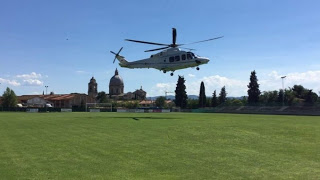
(Left, the papal helicopter landing at about 11:22 a.m. this morning in a field in , the town in the valley below Assisi where St. Francis lived near the Portiuncula, and where he died in 1226 A.D., almost 800 years ago)
At the same time, the Pope’s Secretary of State, Cardinal Pietro Parolin, is in New York City, where yesterday, September 19, he delivered an address to the United Nations, telling his listeners that the world’s massive refugee problem — some 65 million refugees are in movement around the world — must be addressed in the countries the refugees are fleeing from (for the full text of Parolin’s address, see below).
The two trips make clear that the Vatican is engaged now in a “peace offensive” on all fronts: prayers for peace, gatherings for peace, and diplomacy for peace in every venue, in every nunciature, in the world.
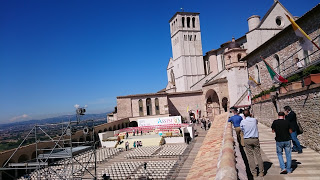
(Above, an image of the square in Assisi just below the Basilica of St. Francis where there was a common prayer today, in an effort to halt the unfolding “third world war” which Francis fears has already begun “piecemeal,” “in pieces”)
Thus, Francis is using all the means at his disposal to halt this developing war.
After landing, Francis went up from the valley to the main city of Assisi, where he greeted Ecumenical Patriarch Bartholomew of Constantinople and dozens of other religious leaders.
(Below, Pope Francis greets Patriarch Bartholomew, Ecumenical Patriarch of the world’s Orthodox Churches. The two ate lunch together, along with other religious leaders and 12 refugees who have sought refuge in Italy, in the dining hall of the Sacro Convento, next to the Basilica of St. Francis)
Then, Francis addressed the entire gathering in the main square next to the basilica (photo below).
Then the gathering divided into separate religious groups. Christians gathered in the lower section of the Basilica of St. Francis for several hours of prayer and addresses from various leaders, including Anglican leader Archbishop Justin Welby.
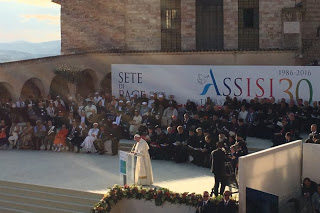
While all this was happening in Assisi, Cardinal Parolin was busy in America, meeting yesterday with U.S. Secretary of State John Kerry, the head of the U.S. diplomacy.
Kerry and Parolin discussed the humanitarian situation in Syria and reiterated their mutual support for a cessation of hostilities, official communiques said.
Kerry also praised the efforts of the Holy See and Pope Francis to bring the refugee crisis to the world’s attention.
Concerning the violence in Ukraine, which has led to an estimated 600,000 refugees, Kerry and Parolin stressed the need for adherence to the Minsk Peace Accords and an end to the violence.
At the same time, in related news, it has just been announced that Cardinal Parolin will visit Colombia for the September 26 signing of peace accords which will hopefully put an end to 52 years of civil war in that country (link).
The peace agreement will be between the Colombian government and rebel forces in the country. It was agreed to August 24 between the government of Colombian President Juan Manuel Santos and the country’s largest rebel group, the Revolutionary Armed Forces of Columbia (FARC). The signing will be on September 26 before many diplomatic delegations, then submitted to a popular vote by the Colombian people on October 2.
So here is the situation: Pope Francis and his diplomats are engaged in an intense effort to help bring peace in many different places out of a fear of the misery that will be caused if the various wars now taking place continue, intensify, and combine to create a true world war.
Assisi today is one outstanding example of this effort, and it is to be hoped that it will have a positive effect.
But the global situation is now increasingly dramatic, and much more needs to be done in order to bring peace instead of an expanding war.
Here is a link to a Rome Reports video summarizing what happened today, which readers may find interesting.
Here is the official text approved by today Assisi prayer for peace gathering.
Common Declaration of Assisi
Men and women of various religions, we gather as pilgrims in the city of Saint Francis.
Thirty years ago in 1986, religious representatives from all over the world met here at the invitation of Pope John Paul II.
It was the first such solemn gathering that brought so many together, in order to affirm the indissoluble bond between the great good of peace and an authentic religious attitude.
From that historic event, a long pilgrimage was begun which has touched many cities of the world, involving many believers in dialogue and in praying for peace.
It has brought people together without denying their differences, giving life to real interreligious friendships and contributing to the resolution of more than a few conflicts.
This is the spirit that animates us: to bring about encounters through dialogue, and to oppose every form of violence and abuse of religion which seeks to justify war and terrorism.
And yet, in the years that have followed, numerous populations have nonetheless been painfully wounded by war.
People do not always understand that war harms the world, leaving in its wake a legacy of sorrows and hate. In war, everyone loses, including the victors.
We have prayed to God, asking him to grant peace to the world.
We recognize the need to pray constantly for peace, because prayer protects the world and enlightens it.
God’s name is peace.
The one who calls upon God’s name to justify terrorism, violence and war does not follow God’s path.
War in the name of religion becomes a war against religion itself.
With firm resolve, therefore, let us reiterate that violence and terrorism are opposed to an authentic religious spirit.
We have heard the voice of the poor, of children and the younger generations, of women and so many brothers and sisters who are suffering due to war.
With them let us say with conviction: No to war!
May the anguished cry of the many innocents not go unheeded.
Let us urge leaders of nations to defuse the causes of war: the lust for power and money, the greed of arms’ dealers, personal interests and vendettas for past wrongs.
We need a greater commitment to eradicating the underlying causes of conflicts: poverty, injustice and inequality, the exploitation of and contempt for human life.
May a new season finally begin, in which the globalized world can become a family of peoples.
May we carry out our responsibility of building an authentic peace, attentive to the real needs of individuals and peoples, capable of preventing conflicts through a cooperation that triumphs over hate and overcomes barriers through encounter and dialogue.
Nothing is lost when we effectively enter into dialogue.
Nothing is impossible if we turn to God in prayer.
Everyone can be an artisan of peace.
Through this gathering in Assisi, we resolutely renew our commitment to be such artisans, by the help of God, together will all men and women of good will.
Here is the address of Pope Francis today in Assisi on the concluding day of a 4-day gathering to pray for peace in the world.
“We thirst for peace”
By Pope Francis
Your Holinesses, Distinguished Representatives of Churches, Christian Communities, and Religions, Dear Brothers and Sisters,
I greet you with great respect and affection, and I thank you for your presence here.
We have come to Assisi as pilgrims in search of peace.
We carry within us and place before God the hopes and sorrows of many persons and peoples.
We thirst for peace.
We desire to witness to peace.
And above all, we need to pray for peace, because peace is God’s gift, and it lies with us to plead for it, embrace it, and build it every day with God’s help.
“Blessed are the peacemakers” (Mt 5:9). Many of you have travelled a great distance to reach this holy place. You set out, and you come together in order to work for peace: these are not only physical movements, but most of all movements of the soul, concrete spiritual responses so as to overcome what is closed, and become open to God and to our brothers and sisters.
God asks this of us, calling us to confront the great sickness of our time: indifference. It is a virus that paralyzes, rendering us lethargic and insensitive, a disease that eats away at the very heart of religious fervour, giving rise to a new and deeply sad paganism: the paganism of indifference.
We cannot remain indifferent.
Today the world has a profound thirst for peace. In many countries, people are suffering due to wars which, though often forgotten, are always the cause of suffering and poverty.
In Lesbos, my dear brother, the Ecumenical Patriarch Bartholomew, and I saw the sorrow of war in the eyes of the refugees, the anguish of peoples thirsting for peace.
I am thinking of the families, whose lives have been shattered; of the children who have known only violence in their lives; of the elderly, forced to leave their homeland.
All of them have a great thirst for peace.
We do not want these tragedies to be forgotten. Rather together we want to give voice to all those who suffer, to all those who have no voice and are not heard. They know well, often better than the powerful, that there is no tomorrow in war, and that the violence of weapons destroys the joy of life.
We do not have weapons. We believe, however, in the meek and humble strength of prayer.
On this day, the thirst for peace has become a prayer to God, that wars, terrorism and violence may end.
The peace which we invoke from Assisi is not simply a protest against war, nor is it “a result of negotiations, political compromises or economic bargaining. It is the result of prayer” (John Paul II, Address, Basilica of Saint Mary of the Angels, 27 October 1986: Insegnamenti IX,2 [1986], 1252).
We seek in God, who is the source of communion, the clear waters of peace for which humanity thirsts: these waters do not flow from the deserts of pride and personal interests, from the dry earth of profit at any cost and the arms trade.
Our religious traditions are diverse. But our differences are not the cause of conflict and provocation, or a cold distance between us.
We have not prayed against one another today, as has unfortunately sometimes occurred in history.
Without syncretism or relativism, we have rather prayed side-by-side and for each other.
In this very place Saint John Paul II said: “More perhaps than ever before in history, the intrinsic link between an authentic religious attitude and the great good of peace has become evident to all” (Address, Basilica of Saint Mary of the Angels, 27 October 1986: Insegnamenti IX,2, 1268).
Continuing the journey which began thirty years ago in Assisi, where the memory of that man of God and of peace who was Saint Francis remains alive, “once again, gathered here together, we declare that whoever uses religion to foment violence contradicts religion’s deepest and truest inspiration” (Address to the Representatives of the World Religions, Assisi, 24 January 2002: Insegnamenti XXV,1 [2002], 104).
We further declare that violence in all its forms does not represent “the true nature of religion. It is the antithesis of religion and contributes to its destruction” (Benedict XVI, Address at the Day of Reflection, Dialogue and Prayer for Peace and Justice in the World, Assisi, 27 October 2011: Insegnamenti VII,2 [2011], 512).
We never tire of repeating that the name of God cannot be used to justify violence. Peace alone, and not war, is holy!
Today we have pleaded for the holy gift of peace.
We have prayed that consciences will be mobilized to defend the sacredness of human life, to promote peace between peoples and to care for creation, our common home.
Prayer and concrete acts of cooperation help us to break free from the logic of conflict and to reject the rebellious attitudes of those who know only how to protest and be angry.
Prayer and the desire to work together are directed towards a true peace that is not illusory: not the calm of one who avoids difficulties and turns away, if his personal interests are not at risk; it is not the cynicism of one who washes his hands of any problem that is not his; it is not the virtual approach of one who judges everything and everyone using a computer keyboard, without opening his eyes to the needs of his brothers and sisters, and dirtying his hands for those in need.
Our path leads us to immersing ourselves in situations and giving first place to those who suffer; to taking on conflicts and healing them from within; to following ways of goodness with consistency, rejecting the shortcuts offered by evil; to patiently engaging processes of peace, in good will and with God’s help.
Peace, a thread of hope that unites earth to heaven, a word so simple and difficult at the same time.
Peace means Forgiveness, the fruit of conversion and prayer, that is born from within and that, in God’s name, makes it possible to heal old wounds.
Peace means Welcome, openness to dialogue, the overcoming of closed-mindedness, which is not a strategy for safety, but rather a bridge over an empty space.
Peace means Cooperation, a concrete and active exchange with another, who is a gift and not a problem, a brother or sister with whom to build a better world.
Peace denotes Education, a call to learn every day the challenging art of communion, to acquire a culture of encounter, purifying the conscience of every temptation to violence and stubbornness which are contrary to the name of God and human dignity.
We who are here together and in peace believe and hope in a fraternal world.
We desire that men and women of different religions may everywhere gather and promote harmony, especially where there is conflict.
Our future consists in living together. For this reason we are called to free ourselves from the heavy burdens of distrust, fundamentalism and hate.
Believers should be artisans of peace in their prayers to God and in their actions for humanity!
As religious leaders, we are duty bound to be strong bridges of dialogue, creative mediators of peace.
We turn to those who hold the greatest responsibility in the service of peoples, to the leaders of nations, so that they may not tire of seeking and promoting ways of peace, looking beyond their particular interests and those of the moment: may they not remain deaf to God’s appeal to their consciences, to the cry of the poor for peace and to the healthy expectations of younger generations.
Here, thirty years ago, Pope John Paul II said: “Peace is a workshop, open to all and not just to specialists, savants and strategists. Peace is a universal responsibility (Address, Lower Piazza of the Basilica of Saint Francis, 27 October 1986: l.c., 1269).
Let us assume this responsibility, reaffirming today our “yes” to being, together, builders of the peace that God wishes for us and for which humanity thirsts.
Here is the address of Ecumenical Patriarch Bartholomew in Assisi.
Address of Greek Orthodox Ecumenical Patriarch Bartholomew
“Our thirst for peace is quenched”
By Ecumenical Patriarch Bartholomew of Constantinople
Your Holiness.
Eminences, Excellencies,
Distinguished Representatives of Religions and Cultures,
Authorities,
Brothers and Sisters,
By gathering us all together, this International Meeting has given us the chance to look into each other’s eyes, to speak honestly, to listen to each other, to enjoy each other’s riches, and, essentially, to be “Friends.”
And in this friendship, true unconditional love for each other, our thirst for peace is quenched.
It is quenched, because peace is free, profound, and rooted in the heart of every human being, who for believers are made in the image and likeness of God, and for cultures and for humanist thinkers are part of the same human family.
Indeed, we have not only commemorated an extraordinary event held by our predecessors thirty years ago.
We have also renewed our commitment to peace with a new spirit, in Friendship, through courageous gestures, opening up new paths to dialogue and cooperation between Cultures and the great Religious Families of the world.
However, Peace needs a few cornerstones to uphold it even when it is endangered.
There can be no peace without mutual respect and acknowledgment.
There can be no peace without justice, there can be no peace without fruitful cooperation among all the peoples in the world.
In these years, we can again see ethnic, religious, and cultural majorities sense their respective minorities as alien bodies, dangerous for their integrity, as something to be marginalized, expelled, and sometimes, unfortunately, annihilated.
We witness minorities that close themselves in their own ghettos out of fear of disappearance, fearful of comparisons, too often turning to violence.
This is discouraging, it causes mass migration, and it creates problems in welcoming, solidarity, and humanity.
But peace also needs justice.
Justice is a world economy renewed, that cares for the needs of the poorest; it is paying attention to our planet’s situation, safeguarding its natural environment, which is the work of God for believers, but also a Common Home for everyone.
It also means to safeguard the cultural, religious, and artistic traditions of every people of the earth.
It means being capable of solidarity, not as mere assistance, but feeling the need, the pain, the joy of the other as if it were our own.
Justice is consistency with what we profess and believe in, while being capable of dialogue with the other, capable to see the riches of the other, capable of not overpowering the other, of not feeling above or below our neighbour.
Justice is making it possible for everybody to keep living in his or her own forefathers’ land, in peace and love, for everybody to return to his or her own home for the growth of human society.
Therefore, peace comes from mutual knowledge and cooperation.
As Faiths, as Humanist Cultures, as Human Beings, today we must revive all this, in a new way, through new gestures.
However, as we return to our homes, we believe that every Religious Family, every Culture — in this precise moment in history — must look within itself; we believe, while respectful of every religious or humanist belief, that self-critic and self-analysis are necessary.
We need to be able to ask ourselves where we may have been wrong, or where we have not been careful enough; because fundamentalisms have risen, threatening not only dialogue with others, but even dialogue within our own selves, our very own consciences.
We have to be able to isolate them, to purify them, in the light of our faiths, to transform them into richness for all.
If we are able to do so, then dialogue will become real and vital, because cooperation will not be subjugation, but a chance to intervene together in history, the chance to write its fates, together.
We have the obligation to commit ourselves together for the preservation of every Human Being from his or her conception to natural end, respectful of every stage of his or her life.
We must commit ourselves for the preservation of our Common Home and all that is in it.
Because, in creating it, God did not want to have one plant, one animal, one single person, one planet, one star.
He wanted many of them, all different, each with its own specificity and peculiarity, interconnected in a communion of purpose and love.
This is the richness we need to proclaim, safeguard, and live together.
Here is the address of Cardinal Parolin to the UN in New York yesterday.
Address of Cardinal Pietro Parolin to the UN in New York (photo)
“The primary cause of today’s refugee and migrant crisis is man-made”
September 19, 2016
Statement on Roundtable #1: Addressing the Root Causes of Large Movements of Refugees and Migrants
By His Eminence Cardinal Pietro Parolin, Secretary of State of His Holiness Pope Francis
Mr. Chair,
During the preparatory phases of this Summit, much attention and effort have been dedicated to the search for durable solutions and more effective ways of sharing responsibility in the face of large movements of refugees and migrants.
The greatest challenge before us, however, is to identify and act on the root causes that force millions of people to leave their homes, their livelihoods, their families and their countries, risking their very lives and those of their loved ones in the search for safety, peace and better lives in foreign lands.
[In his report In safety and dignity: addressing large movements of refugees and migrants, the UN Secretary General maintained that causes of refugee movements include “conflict, violence, persecution, political repression and other serious human rights violations.”]
The primary cause of today’s refugee and migrant crisis is man-made: namely, wars and conflicts.
Since human choices provoke conflicts and wars, it is well within our power and responsibility to address this root cause that drives millions to become refugees, forced migrants and internally displaced persons.
The Holy See thus pleads for a common commitment on the part of individual governments and the international community to bring to an end all fighting, hatred and violence, and to pursue peace and reconciliation.
The Holy See remains firmly convinced that, as Pope Francis has often stated, the way to resolve open questions must be that of diplomacy and dialogue.
Moreover, in the last few years religious persecution has become more and more a cause of displacement.
Although other groups are heavily targeted, many reports confirm that Christians are by far the most persecuted faith group, speaking of “religious-ethnic cleansing”, which Pope Francis calls “a form of genocide”. Some of those persecuted, even in asylum countries, are facing harassment in refugee settings. We must not abandon them.
The preparatory document for this Roundtable rightly highlights that the availability and use of low technology weaponry has resulted in the spread of conflict, especially in countries and societies where the rule of law is fragile and poverty is widespread.
Mr. Chair,
The Holy See has repeatedly called to limit strictly and to control the manufacture and sale of weapons, where the likelihood of their illegal use and their falling into the hands of non-state actors is real and present.
The proliferation of any type of weapons aggravates situations of conflict and results in huge human and material costs, provoking large movements of refugees and migrants and profoundly undermining development and the search for lasting peace.
Addressing the root causes of displacement of peoples requires strength and political will.
As Pope Francis has said, this “would mean rethinking entrenched habits and practices, beginning with issues involving the arms trade, the provision of raw materials and energy, investment, policies of financing and sustainable development, and even the grave scourge of corruption”.
Finally, the Holy See feels itself compelled to draw urgent attention to the plight of those migrants fleeing from situations of extreme poverty and environmental degradation.
While these are not recognized by international conventions as refugees and thus do not enjoy any particular legal protection, nonetheless they suffer greatly and are most vulnerable to human trafficking and various forms of human slavery.
For this reason, in our efforts to address effectively the root causes of large movements of refugees and other forced migrants, we should also strive to eliminate the structural causes of poverty and hunger, attain more substantial results in protecting the environment, ensure dignified and productive labor for all, provide access to quality education, and give appropriate protection to the family, which is an essential element in human and social development.
Thank you, Mr. Chair.
1. Pope Francis, Address to the Members of the Diplomatic Corps Accredited to the Holy See for the Traditional Exchange of New Year Greetings, Vatican City, 13 January 2014.
2. Pope Francis, Address to the UN Systems Chief Executives Board for Coordination, Vatican City, 9 May 2014.
Note: The Moynihan Letters go to some 20,000 people around the world. If you would like to subscribe, click here to sign up for free. Also, if you would like to subscribe to our print magazine, Inside the Vatican, please do so! It would support the old technology of print and paper, as well as this newsflash. Click here.
What is the glory of God?
“The glory of God is man alive; but the life of man is the vision of God.” —St. Irenaeus of Lyons, in the territory of France, in his great work Against All Heresies, written c. 180 A.D.


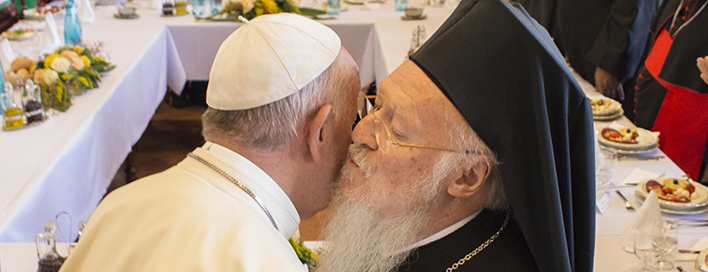
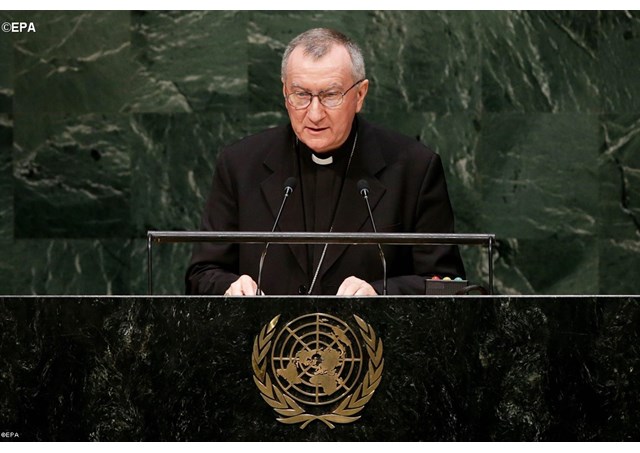





Facebook Comments